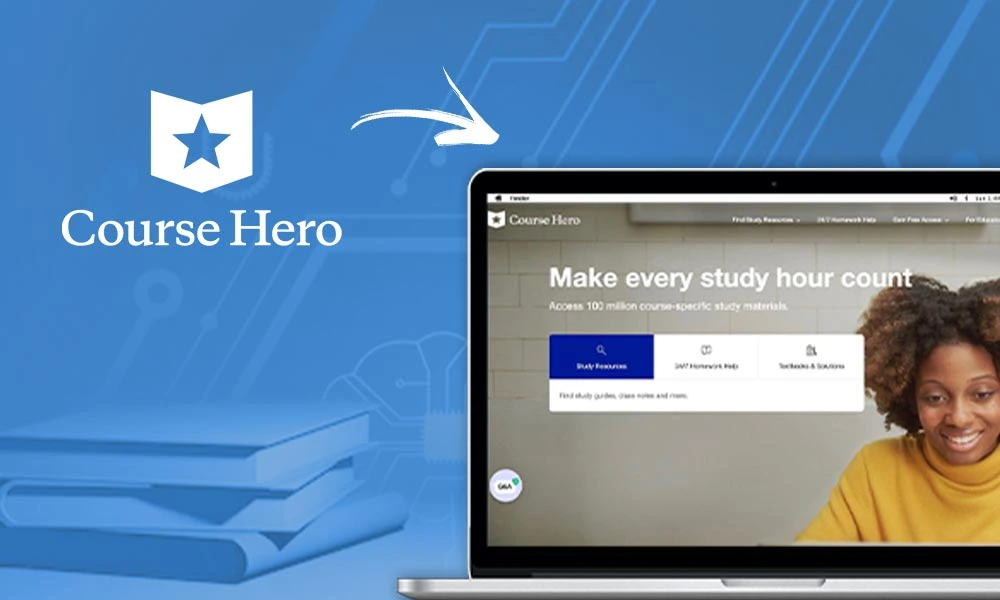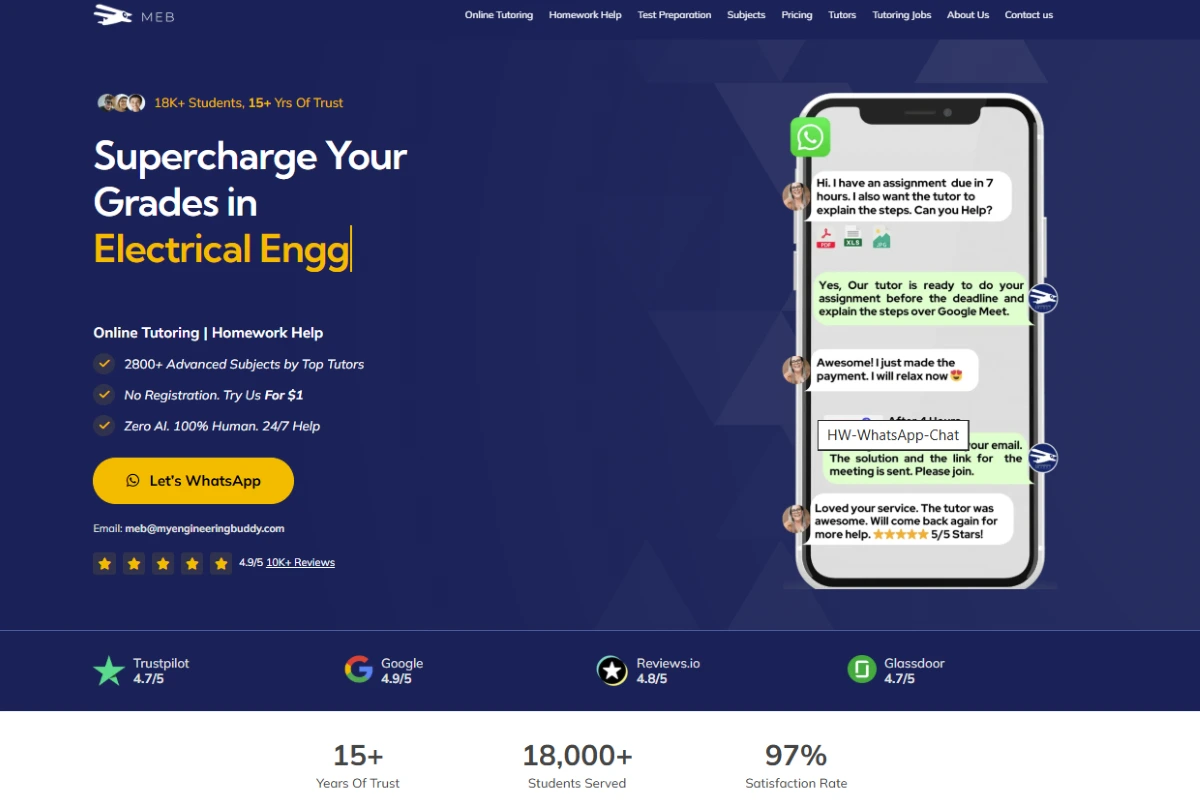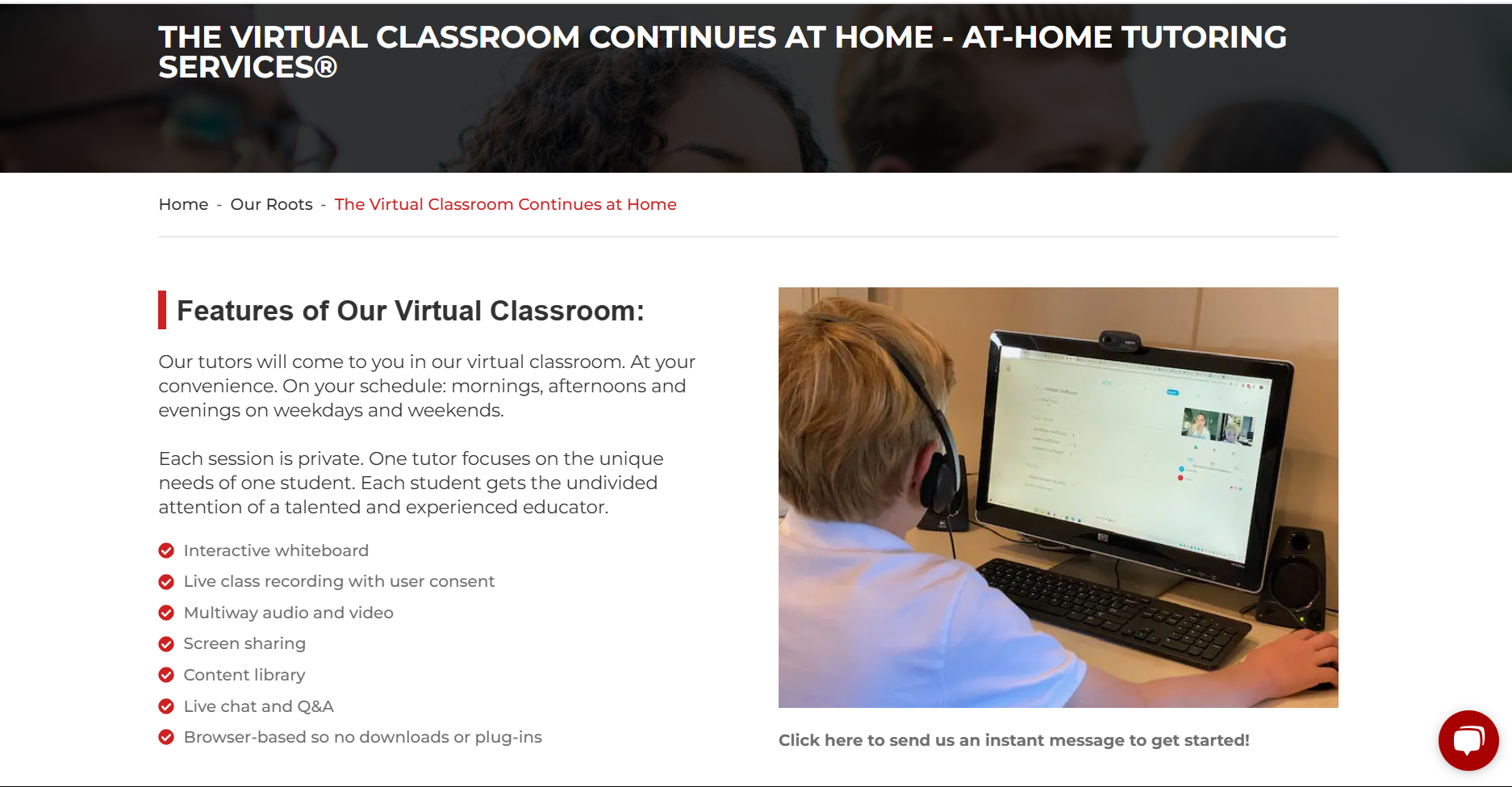TutaPoint is an online tutoring platform founded in 2007, offering one-on-one tutoring mostly in math, science, and foreign languages. It is part of At-Home Tutoring Services, which provides in-person and virtual tutoring across the US. This article examines TutaPoint’s reviews, pricing, and services to help students and parents compare it to other tutoring platforms.

TutaPoint Reviews and Testimonials
We looked at major review sites to see how people rate TutaPoint (At-Home Tutoring Services). Overall, customer feedback is mixed.
Google Reviews (via Trustpilot/TrustIndex): At-Home Tutoring Services has a 5.0/5 rating from 35 Google reviews. Many parents praise the platform: they mention “excellent tutors” and report grade improvements. Reviewers highlight that tutors are engaging, helpful, and available 24/7. One parent wrote “Aaron was an excellent tutor… my daughter ended up with an A in the class!!”. The positive themes are tutor quality, personal attention, and responsive service. There were virtually no negative comments on Google.
Yelp (At-Home Tutoring Services): The Houston branch of At-Home has 4 reviews averaging 4.0 stars. Customers again praise staff and tutors for being “sincere, compassionate, intelligent” and for hands-on service. One wrote that the team “will stay in the loop with parents”. However, one negative Yelp reviewer reported scheduling problems: an instructor “no-show” and confusion over online vs in-person lessons. In summary, Yelp users find the support team caring and communicative, but some note occasional organizational issues.
Tutors.com listing (TutaPoint Inc): A tutoring directory page for TutaPoint Inc (Houston, TX) shows 1 user review (5/5). The reviewer praised the staff’s support and “easy to navigate” online workshops. The listing also highlights that TutaPoint uses an “advanced virtual classroom” with tools like whiteboards and that they match students via an algorithm. This suggests a focus on tech features, though the single review is limited evidence.
User Review Aggregators: A site called Online-Tutoring-USA compiles a few user reviews (3 total) and rates TutaPoint 2.3/5 stars (based on older comments). These reviews mention the $99 monthly plan and warn it can become expensive for casual use. They also note that only certain subjects (math, science, languages) are covered, so some users feel the platform is limited. For example, one review says “the unlimited plan is only $99 per month, but subjects are limited”. These reviews are dated (~2014) and mostly negative about price and scope.
Company Website: We found no public testimonials on TutaPoint’s own site (At-Home Tutoring Services) to cite.
Is TutaPoint legit? Yes – TutaPoint is a legitimate tutoring service that has been in business since 2007. The parent company has positive reviews on some platforms (5.0/5 on Google), indicating satisfied customers. However, independent user feedback is mixed. Some users report good tutor matches and results, while others complain about limited subjects and high costs. Overall, the company exists and delivers tutoring, but quality may vary.
Summary: In summary, many reviews praise TutaPoint’s friendly staff and accessible tutors (especially via Google and Indeed reviews). The key issues raised are relatively high prices (unless using the flat-rate plan) and a narrow focus on STEM subjects. Users find the tutoring helpful, but note the cost and coverage limitations.

TutaPoint Pricing
Pricing Range
TutaPoint’s tutoring fees vary. One source states basic tutoring is about USD $28 per hour. Another review (2025) lists rates starting around $50/hour for standard subjects and up to $95 for test prep. The platform also offers an unlimited monthly subscription for about $99 per month. (That means you pay one flat fee instead of per session.) Rates generally align with industry norms (typical online tutors charge ~$25–$50/hr). Advanced test-prep and experienced tutors may cost more.
There is no publicly advertised platform commission. Fees are largely fixed by the company. For example, their flat monthly plan is widely mentioned. (It appears tutors do not set their own hourly rates.)
Note: We could not find an official “Pricing” page link for TutaPoint to verify these numbers. The figures above come from third-party reviews.
What students say about pricing
Students generally feel that the pricing is comparable to other tutoring options. For reference, Tutoring platforms often charge $25–$50 per hour on average. In that context, TutaPoint’s base rate (~$28–$50) is on the low-to-average end. Reviewers note the unlimited $99 plan is a good deal if you use it frequently, since otherwise pay-per-session can add up. No one complained explicitly, but one review cautioned that pay-by-minute tutoring “can get prohibitively expensive” if you don’t use a flat-rate plan.
In short, students find the pricing reasonable but not unusually low. It is roughly in line with industry norms. The bundled monthly plan is seen as good value if you need regular help.
Hidden costs
There appear to be no major hidden fees. At-Home Tutoring (TutaPoint’s parent) states that billing is based strictly on tutor time and there are “no setup fees, packages to select from or charges for drive time”. In other words, you only pay for the actual tutoring session. We found no evidence of extra registration fees or unexpected costs. (Any specific fees beyond the hourly/session rates were not mentioned in reviews or on official materials.)
How pricing works
TutaPoint uses a simple payment model. You pay by the session or through the monthly subscription. According to one review, “It’s free to join and get started – you only pay when you start using resources”. Payment is typically made upfront or monthly, and the site only accepts credit cards. There are no long-term contracts or hidden subscription commitments (aside from the $99 flat plan). Sessions are billed to the nearest minute, so longer lessons cost proportionally more. We did not find any special discount programs (e.g. no standard student or military discounts listed). Overall, the process seems straightforward: sign up, choose a plan or pay-per-session, and pay by credit card.
Free Trial
No formal free trial was found. TutaPoint does not advertise a free session or trial period. (One review notes that signing up is free, but you begin paying once you request tutoring.) In practice, there is no “free demo lesson.” We saw no mention of a trial on their site or in reviews.
Refund policy
We could not locate an official refund policy on their site. Given this, refunds are likely not emphasized. None of the user reviews discussed successful refunds or money-back guarantees. Instead, one unhappy user simply warned “they are cheating you!” without mentioning any refund attempt. In summary, there is no evidence that TutaPoint offers a generous refund policy. The lack of clear information suggests students should assume payment is final unless specified otherwise. We found no reports of hidden overcharges or billing sneaks in reviews.
TutaPoint Alternatives
Students and parents often compare TutaPoint to other tutoring platforms to find the best fit. Below are some popular alternatives and how they stack up, including a mention of My Engineering Buddy (our service). These are meant to be factual comparisons, not sales pitches.
-
Wyzant
Pros: Wyzant is a large tutoring marketplace with over 80,000 tutors. It covers almost any subject (from algebra to physics and foreign languages) and lets students filter by budget and expertise. Families can find tutors for virtually any grade level. Wyzant lets tutors set their own hourly rates, which range widely ($10 up to $500) with an average around $35–$80/hr. It offers both online and in-person lessons. A useful feature is the “Good Fit Guarantee” – if the first hour isn’t a match, it is refunded.
Cons: Wyzant tends to be more expensive than TutaPoint. Its average rates ($35–$80/hr) are higher than TutaPoint’s ~$28–$50. Wyzant also charges a 9% service fee on top of tutors’ rates. Because it is a large marketplace, quality can vary; you must vet tutors yourself. In contrast, TutaPoint fixes the price and claims a vetted pool (mostly US-based certified tutors). Wyzant’s flexibility is nice, but you pay more for it.

-
Chegg Tutors
Pros: Chegg is best known for its large Q&A and homework-help resources, but it also offers live tutoring. It covers a wide array of subjects (all K-12 and college areas) and provides 24/7 tutor access. Chegg’s strengths include extensive supplemental tools like textbook rental, practice problems, and a subscription model that gives unlimited access. Many users cite the 24/7 availability as very convenient.
Cons: Chegg requires a monthly subscription (around $15–$30/mo) even if you rarely use it, which some students find costly. There have been user complaints about unclear billing and tough refund policies. Tutor quality on Chegg can be hit-or-miss: some students report unhelpful or low-prep tutors. Unlike TutaPoint’s personalized matching, Chegg uses a more general platform model. Overall, Chegg is broader than TutaPoint in subjects, but it emphasizes ongoing subscriptions and may lack the one-on-one consistency TutaPoint promotes.

-
Course Hero
Pros: Course Hero is known for its large library of study materials and homework solutions, including step-by-step explanations. It offers 24/7 access to tutors for homework help on many subjects. Students can get quick answers to textbook questions and upload problems for a guided solution.
Cons: It is not a live tutoring platform in the same way. Course Hero focuses on asynchronous help (like Q&A answers), so you don’t get a live video tutor. It also uses a subscription model for access. In contrast, TutaPoint provides real-time one-on-one lessons. For scheduled, interactive tutoring, Course Hero isn’t a direct replacement. It can help with homework answers but lacks live instruction.

-
My Engineering Buddy
Pros: My Engineering Buddy (MEB) is aimed at college and advanced STEM students. It offers tutoring in engineering, math, and science, often at lower rates (starting around $20–$25/hr). Tutors are specialized subject-matter experts (often PhD or graduate-level), and they set their own prices. MEB uses detailed explanations and a satisfaction guarantee. Students note that MEB tutors are very experienced in tough subjects. It has good resources and flexible scheduling.
Cons: Unlike TutaPoint, which covers many K-12 topics, MEB is narrower (focus on engineering and advanced math). It may not have tutors for elementary or general test prep. Also, MEB’s style is highly academic, which may be intense for some users. However, in areas where it specializes, MEB often outpaces TutaPoint with more depth. (For example, TutaPoint might cover calculus, but MEB offers full engineering topics with college-level rigor.)

How it Works?
For Students
Sign-up: Students and parents can sign up for free on TutaPoint’s website. You usually fill in a brief profile and state your subject needs and grade level.
Finding a Tutor: Once registered, students browse tutor profiles by subject and level. (On At-Home’s site, you can filter tutors or request a match.) Students can chat with or book the tutor they prefer. Matching is partly automated – the site uses an “algorithmic process” to pair you with a compatible tutor.
Scheduling Sessions: Students then schedule lessons at times they choose. TutaPoint boasts 24/7 availability, so you can book almost any time. Online sessions take place in their virtual classroom (with video, audio, whiteboard, etc.). Sessions are billed to the minute, and payment is made before the session.
For Tutors
TutaPoint is part of At-Home Tutoring Services, which hires qualified tutors. To become a tutor, one must apply on the company’s website (they have an online application form). Tutors typically need at least a college degree in their subject and relevant experience. The company reviews applications and often requires a background check. Once approved, tutors get access to the virtual classroom and scheduling system. (See At-Home’s “Become a Tutor” page for details.)
Getting Started: Tutors create a profile listing their qualifications and rate (TutaPoint fixes the rate). They then wait for lesson requests from students. For example, the parent company encourages tutors by saying its platform has “state-of-the-art tools” to make teaching smooth.
We could not find an open link to TutaPoint’s tutor signup. However, it is clear the process is managed via At-Home Tutoring’s site. (In general, you would visit their “Careers” or “Tutor Applications” page to apply.)
FAQs
Q: Can tutors set their own fee or is it fixed by the company?
A: On TutaPoint, tutors do not choose individual rates. The platform advertises a standard rate (around $28–$50/hr) and tutors accept that fixed pay. (By contrast, some platforms like Wyzant allow tutors to set prices.)
Q: How much can a tutor expect to earn per hour?
A: Glassdoor data suggests TutaPoint tutor pay is in the low range (around $14–$24/hr). The exact pay depends on qualifications and session type. Tutors keep their base pay for each session; the company does not list a commission for tutors.
Q: How many hours of tutoring work can a tutor get per month?
A: There is no fixed amount; it varies by student demand. In general, tutors get as many hours as students need. Some tutors report a few sessions per week, but this depends on the tutor’s availability and subject popularity. If a tutor is highly rated, they may get more bookings.
Q: Is it easy to find students on TutaPoint?
A: Opinions vary. Tutors note that scheduling is very flexible and students can book anytime, which makes it easy to fit lessons into a schedule. However, some say the pay is relatively low and it can take time to build a steady stream of students. TutaPoint does match students automatically, but because it is smaller than some competitors, a new tutor might need to market themselves to get students.
Q: Tips on how to get more students on TutaPoint?
A: As with any platform, having a strong profile and good reviews helps. Tutors should list all their qualifications, mention student success stories, and be responsive when students ask questions. Being available at popular tutoring times (evenings/weekends) can also attract more students. Offering a short introductory session (if allowed by platform) and following up politely with parents can improve retention.
Q: What do tutors like about TutaPoint?
A: Tutors appreciate the flexible hours and remote work. Indeed reviewers say they enjoy the “easy schedule” and helping students across many subjects. They also like that tutoring can be done from home and that there is 24/7 demand (you can teach whenever you want). One tutor noted there is “not much that can be said against this company,” praising the convenience of online tutoring.
Q: What do tutors not like about TutaPoint?
A: The main complaint is about pay. Tutors say the hourly rate is relatively low compared to some other sites. There is also little room for career advancement – it’s mostly independent contract work. One tutor mentioned students often forget to turn on their microphone, which makes sessions harder. Overall, the negative feedback is limited because many tutors simply use it for extra income on a flexible schedule.
TutaPoint: Company Information
Founded: 2007. TutaPoint was started by Ryan Duques and Michael Callaghan. In 2017, it was acquired by the founders of At-Home Tutoring Services, so it now operates under that brand. The company has been in business for over 17 years (since 2007).
Headquarters & Scale: At-Home Tutoring Services (TutaPoint’s parent) is based in Houston, TX, with an office in New York. It claims to serve students nationwide: its virtual services reach “all 50 states”. A business directory lists TutaPoint Inc as having about 140 employees and 18 years in business. The platform mainly serves the USA, though it can be accessed worldwide online.
Services: TutaPoint focuses on 1:1 tutoring. It offers help in subjects like mathematics (algebra through calculus), sciences (biology, chemistry, physics), language arts, test prep (SAT/ACT), and various world languages (e.g. Spanish). Their service model is live, online tutoring in a proprietary virtual classroom with tools like video chat and whiteboard. It also provides in-person tutoring locally through At-Home’s network (depending on location). Beyond live sessions, they do not offer things like automated homework solutions.
Subjects Offered: The main subjects are math and science for grades 6–12, plus K–8 reading and writing. (BBB notes TutaPoint specializes in math and science for high school grades.) They also list multiple languages and test prep. Major subjects include Algebra, Geometry, Calculus, Physics, Chemistry, Biology, English, Writing, Spanish, and more.

USP of TutaPoint
- Varied STEM tutoring: Covers math, science, and foreign languages. Users say tutors are knowledgeable in these areas.
- Flexible scheduling: Tutors are available 24/7, so students can book help anytime. Many reviews praise the ability to get help any hour.
- Personalized matching: The platform matches students to tutors algorithmically. Trustpilot-style reviews suggest matches are often good and responsive.
- Interactive tools: The sessions use a virtual classroom with video, audio, and whiteboard. This allows a rich tutoring experience, as confirmed by a tutors.com listing describing their “state-of-the-art” classroom.
- Flat-rate plan: The unlimited $99/month plan can be a USP for heavy users, as some reviews noted it’s a solid deal for unlimited help.

Drawbacks of TutaPoint
- Limited subjects/grades: TutaPoint mostly serves high-school math and science. It lacks broad coverage of lower grades and non-STEM fields.
- No tutors set rates: Tutors cannot set higher or lower prices. The flat fee structure (no flexibility in pricing) may deter some tutors who want to price competitively.
- Cost for casual use: If a student needs only occasional help, the pay-as-you-go cost ($28/hr) can add up. Reviews warn that without the monthly plan it “can get prohibitively expensive”.
- No clear refund policy: The company does not promote a money-back guarantee. Students have complained about billing, and no reviews confirm easy refunds.
- Variable tutor quality: While many tutors are praised, some students report mismatches. One review said “they are cheating you”, hinting at dissatisfaction. This suggests that although the company claims vetted tutors, real experiences vary.
Comparison with My Engineering Buddy
My Engineering Buddy (MEB) and TutaPoint serve different niches. MEB focuses on college-level engineering and math, whereas TutaPoint is broader in STEM but more K-12 oriented. In pricing, MEB’s tutors start around $20–$25/hr (lower than TutaPoint’s $28–$50) because tutors set their own rates. MEB provides specialized help for advanced topics, which TutaPoint generally does not. According to user testimonials, MEB tutors are experts in complex subjects and provide very detailed solutions.
By contrast, TutaPoint advertises Ivy-league backgrounds, but those tutors usually teach only high school topics at the rates TutaPoint charges. In customer support and guarantees, MEB offers a clear satisfaction policy, while TutaPoint has no public refund policy. Overall, for advanced STEM help, MEB is often considered superior; for general K-12 tutoring, TutaPoint is a reasonable option.
Customer Support and Policies
TutaPoint’s support is handled by At-Home Tutoring Services. They offer live phone and text support. For example, their website lists a 24/7 phone/text line for any tutoring needs. Response times are generally quick. There is no published guarantee or refund in the terms. In contrast, MEB advertises a money-back guarantee if students aren’t satisfied. Based on reviews, TutaPoint is responsive to scheduling and technical issues, but may not be generous with refunds. (No review mentioned support being poor, just that refunds are unclear.) In summary, both companies offer personal support, but MEB is seen as more customer-friendly with clear refund policies.
Global Reach and Localization
TutaPoint is primarily a U.S.-focused service. All content and tutoring are in English (though they cover Spanish as a subject). We found no evidence of native-language support or regional adaptation. The platform does not target other countries or languages beyond standard foreign language courses. My Engineering Buddy similarly targets English-speaking students worldwide, but neither platform currently offers multiple interface languages or localized content. Both are essentially global online services available anywhere, but they serve English-speaking students.
TutaPoint’s Future Plans
TutaPoint’s parent company has shown interest in educational technology innovation. In 2023, At-Home Tutoring Services announced joining an AI pilot program (Magic School AI) to personalize learning using artificial intelligence. This suggests future plans may include AI-driven tutor matching or adaptive lesson content. Other possible plans (though not public) could be expanding subject coverage or developing a mobile app. For now, no firm announcements beyond the AI partnership have appeared. Their focus seems to remain on improving the existing platform and tools for online tutoring.
FAQs About TutaPoint
Q: How does TutaPoint compare to My Engineering Buddy?
A: TutaPoint is aimed at K-12 math and science tutoring, while My Engineering Buddy (MEB) focuses on advanced college-level STEM. TutaPoint charges flat rates per session (about $28–$50/hr) and has a set tutor pool. MEB’s tutors are often specialized engineers and set their own rates (around $20–$25/hr). If you need help in advanced engineering or higher math, MEB is better; for general high-school subjects, TutaPoint is more appropriate.
Q: What subjects does TutaPoint cover?
A: TutaPoint covers mathematics (algebra, calculus, geometry, etc.), science (physics, chemistry, biology), and some languages and test prep (SAT, ACT, Spanish, etc.). It does not cover all subjects (for example, it has limited offerings in humanities or advanced college topics). If your subject is one of its main offerings, it can help; otherwise you might look to a more specialized service.
Q: How do I sign up for TutaPoint?
A: You sign up online by creating an account on their site (At-Home Tutoring Services). After you register for free, you can search or request a tutor. You do not pay until you book a lesson.
Q: Do tutors at TutaPoint need teaching credentials?
A: Yes. TutaPoint requires its tutors to have at least a college degree in the subject they teach. They undergo a screening process (including background check) as part of their application to At-Home Tutoring Services.
Q: What is the student to tutor ratio?
A: TutaPoint offers one-on-one tutoring only. It does not use group classes or large sessions. So the ratio is always 1 student per tutor during a lesson.
Q: Can I cancel or reschedule a session?
A: TutaPoint’s policy on cancellations was not found on their site. Typically, you can reschedule with advance notice, but last-minute cancellations might still be charged. Check with support when booking. (No user review specifically mentioned cancellation rules.)
Conclusion
TutaPoint’s strengths are its flexible online format and quality tutors in math and science. It excels if you need 24/7 access to STEM help and personalized matching. Its weaknesses include higher costs for one-off sessions, limited subject range, and no clear refund policy. In contrast, My Engineering Buddy offers deeper expertise and competitive pricing for advanced STEM subjects. Students looking for specialized engineering or college-level help may prefer MEB, while those needing general high-school tutoring will find TutaPoint adequate. Both are legitimate platforms, but MEB tends to offer more in-depth STEM support, and TutaPoint offers a broader but shallower tutoring service.
******************************
This article provides general educational guidance only. It is NOT official exam policy, professional academic advice, or guaranteed results. Always verify information with your school, official exam boards (College Board, Cambridge, IB), or qualified professionals before making decisions. Read Full Policies & Disclaimer , Contact Us To Report An Error
